Abstract
According to draft legislation in force, the interest for developing parent educator skills for students, who study Preschool and Primary education, represents a focus on the formation of positive parenting behaviors and attitudes. The practitioner in parenting is called, in international language, a parent educator. This is a professional with initial training in social or medical sciences (educator, teacher, doctor, nurse, social worker, psychologist), who obtained a certificate for a training program in the field of parental education. Parental activity (parenting) has become a topic currently discussed, but we can say that this activity has begun to exist with the appearance of parents. Each parent performs parenting activities personally, but parenting becomes a challenge when the solutions sought and adopted do not lead to the expected results. Taking into consideration the types and quality of parenting as optimal indicators, as well as the understanding the main factors that determine a good practice can become benchmarks for the development of the parent role. This study is the result of an empirical research focusing on the promotion of formal parental education programs for students who study at the specialization Preschool and Primary Education. The Educational Sciences Department of Babes-Bolyai University appreciated the importance of such a program in the current context and included it in the curriculum for this specialization as an optional subject. Within our study we present the results obtained from the participation of students at the course of parental education.
Keywords: Parentingparental educationprograms of parental educationparenting skillsstudents studying preschool and primary education
Introduction
Parental activity is a topic that is being approached more and more frequently both in literature and in various legislative initiatives and programs. De’Ath (1983) mentions that traditional child-raising methods passed on from one generation to the next are no longer adequate, the society being being characterized by many changes in structural, religious, ethical, professional and attitudinal patterns(see Ilovan, Jordan, Havadi-Nagy and Zametter, 2016, for the changes that the Romanian society underwent after 1989), and in this context, parental education has implicitly, become part of the work of various specialists interacting with parents. Most of these specialists are represented by teachers. Their activity is aimed directly at students, but indirectly also on their parents and families (Munteanu & Munteanu, 2009).
Teachers have the duty to maintain a collaborative relationship with the families of their students, as efficiently as possible, to enhance the information that parents have on children, in order to support togheter the harmonious development (Dulamă & Ilovan, 2015, 2017) and the well-being of children (Oltean, 2016). Teachers must also be open towards the increasing diversity existing at the level of family structure and to consider factors such as: international migration of families, active involvement of both parents in the labour market, the age at which marriage and children appear, the divorce rate (Pavel, 2016). Parental education has thus become a component part of the educational system, a dimension of the permanent education (Chis & Coste, 2018), although, parental activity has always been conducted, without a formal previous preparation.
Parental education includes all programs, services and resources offered to parents to support them in raising and educating their children, as well as to determine them to be aware of the importance of their role and to form and improve their parenting skills (Pavel, 2016). Another term used in this context is parenting. Parenting refers to the activities conducted in order to ensure the survival and development of the child, thus being included in parental education (Pavel, 2016). In both Romanian and English literature, the two concepts are often used in a similar, even identical sense.
Pavel (2016, p. 80) argues that regardless of the way in which parenting takes place, it is necessary to consider the following: “parents are the first and best educators of their own children” and wish that their children “develop in a positive and healthy way”; the needs of both parents and child should be known; “parents wish to be helped in order to have an easier job”; the reciprocal relationship between parent and child is influenced by multiple systems; “parenting attitudes, knowledge, abilities and behaviours can be learned and improved through learning and experience”, but parents' education is more effective when parents actively take part at this training; parenting programs should “take into account the diversity displayed by parents”.
Problem Statement
Discussions between teachers and parents show that adults often feel overwhelmed by the challenges of parenting and feel the need for specialized guidance in order to identify optimal parenting practices and to improve their parenting skills. This state is determined by the fact that those who become parents do not always have sufficient knowledge of child development and act either in relation to their own instincts or in relation to their previous experiences. This can bring both positive and negative effects. To support parents and to increase the level of professional competence of future teachers, the Educational Sciences Department of Babes-Bolyai University from Cluj-Napoca, Romania, has included in the curriculum for the specialization Preschool and Primary Education, for the bachelor level, in the third year of studies, the optional subject entitled
The subject
The objectives to be achieved at this subject are: acquiring some concepts that are circumscribed to parental education; explaining and interpreting the roles and responsibilities of parents from different perspectives: historical, social and legislative; being aware and interpreting parental roles and their implications in everyday life.This research verifies the extent to which these objectives have been achieved, valuing the perspective of students participating in the courses of the
Research Questions
The research questions that determined the need for performing the current study were: What are the students' knowledge regarding parenting? What are the training needs of the students in the field of parenting? To what extent does the parental education program proposed in this case respond to the training needs of the students?
Purpose of the Study
The purpose of our study was to investigate the knowledge and abilities needed for conducting parental education within the partnership between school – family – community activities, which was established and developed by the students that chose to study the subject
As a result, the research independent variable consisted in presenting the themes of parental education, quantified in an educational program based on valuing the educational contents found in the course manual and completed by resources from non-formal programs (used by parenting experts – for example – You can also be Supernanny – Petrea, 2007). The dependents variables of the research were: (1) Attitudes and knowledge of parenting evaluated through the assessment test for abilities specific to the field of parental education; (2) The results (grades) obtained at the
Research Methods
Research stages
The first step in conducting the research was to select the sample of participants. The sample of subjects was selected from groups of students who attended the
Two groups of participants were formed: a group of participating students (N = 152 students) in the exploratory stage and a group of participants (N=20) in the final evaluation stage. In the post-experimental (final) phase, the sample of subjects was significantly reduced, the participation being voluntary. Students who participated in this stage of the research provided answers to the parental education assessment test used in the final stage of the research.
After establishing the sample of participants, a comprehensive analysis of the students' knowledge and skills in the field of parental education was carried out, an analysis that aimed to highlight the students' training needs. 152 students were involved in this analysis, who opted for the subject entitled
The analysis of the training needs of the participants and the level of knowledge regarding parental education were made through a test, which had 25 multi-choice items and the students had to select one option for each of them.
In accordance with the results of the needs analysis, the intervention (experimental) stage of the research was conducted. Within this stage activities were conducted during the first semester of the academic year 2017-2018, activities that involved all students, who chose to participate at the subject entitled Parental education (N=146). These activities were conducted within a formal education program destinated to students, emphasizing their theoretical and methodological training in the field of parental education, as well as exercising and evaluating the students' parental abilities based on the training program, in formal educational frameworks.
Through the themes approached during the formative phase, students were trained to acquire basic information on the four topics related to family pedagogy; family education and the role played by the harmonious development of the child, the development of parenting programs at the group / class level (see Table
After completing these contents, the final stage of this study highlighted the progress made by students by assessing products included in the 146 portfolios made during and at the end of each thematic module, presented at the final colloquium and by analyzing the answers from the applied test in the format.
The test in which the assessment of parental education specific abilities was pursued was applied to students who responded to the invitation to access the google docs link. The number of them was 20. The impact of the educational program based on the development of parental skills skills on the students was evaluated / observed.
The personal portfolio was the instrument that permited the quantification of the information acquired during the studied topics. Performance criteria and descriptors used to evaluate products made by students were: "Consistency, accuracy, originality and relevance of the information in developing the essay; Analysis, synthesis and creativity in developing a parenting own taxonomy; respecting the theoretical demands imposed by the design of a parenting program” (Catalano, 2018, p.6).
Research methodology
The research methods through which we obtained information in the research stages described above were the psycho-pedagogical experiment, the quantitative and qualitative analysis of the products included in the evaluation portfolio, the test (Table
The research tool used in this context was the assessment test of parental education specific skills, which was applied to the participants in order to assess their level of knowledge of information regarding parent education. The items of this tool were conceived by the Phd. Student Irina Petrea (2007), promoter of the national parenting program:
Findings
Results obtained in the pre-experimental stage of the research
The analysis of the results highlighted the need to organize the themes of the intervention program in four categories: (1) Parental competence, (2) Knowledge regarding parental education, (3) Parenting style and (4) Communication skills.
We note that the answers given by students at this stage of the research are largely influenced by their previous experiences and not just the knowledge they hold, reflecting personal opinions, and the test items refer to aspects that students can find frequently in the daily life environment and can be compared to those present in an opinion questionnaire. Although no analysis was made very systematic in this regard, there is a need to develop a selective behaviour of students within the present intervention program so that they relate in a more objective and realistic manner to previous personal experiences of parenting.
We present below a selection of the responses given by students to highlight training needs structured by categories.
Based on the analysis of the answers given by the 152 respondents in the first stage of the research, we find that a significant percentage of students, 59.1%, selected the correct variant: variant 4 (all the answers above are correct) (Figure
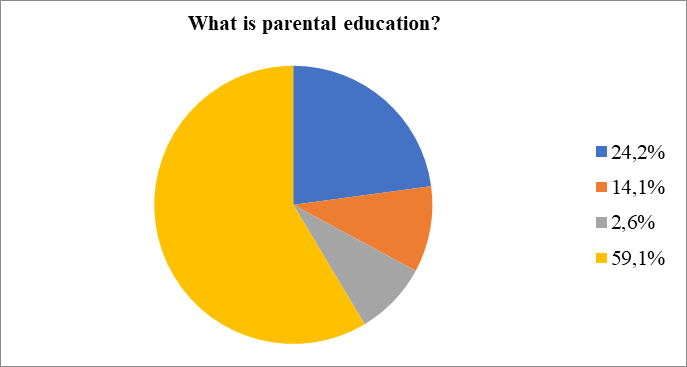
To highlight the need for training, in terms of parental competence, we have selected one of the 6 items in the test, Item no. 5 (Figure
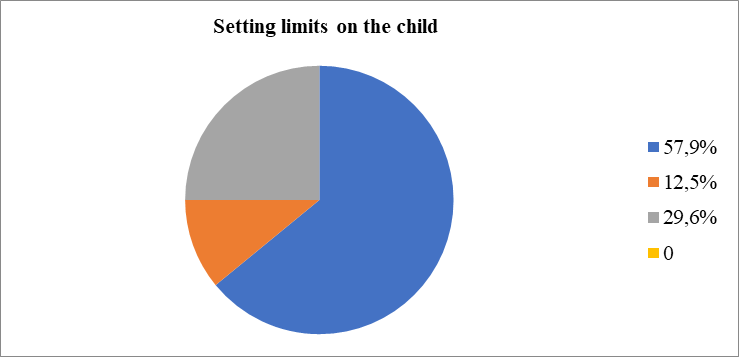
Educational parenting roles have been identified in 7 of the 25 items. The diversity of responses reflects the complexity of parenting skills (Figure
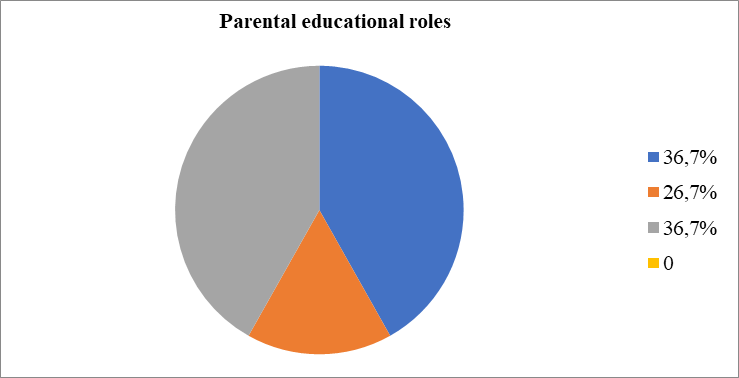
Answers in the Communication Skills category (7 items out of 25) show that 65.6% of students know the communication skills required in parenting (Figure
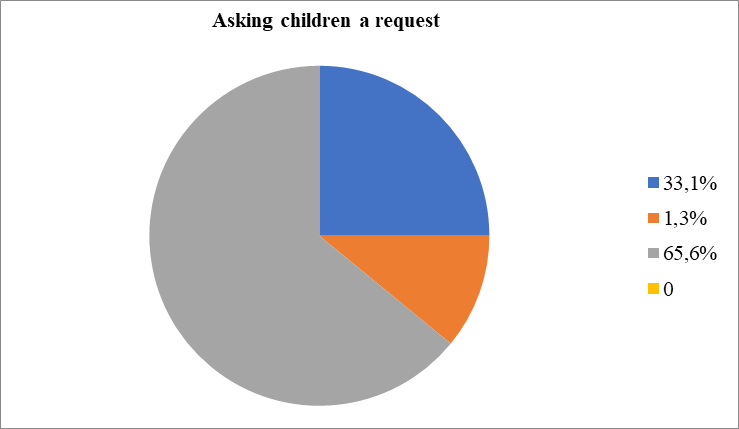
The conclusions regarding the results of the exploratory stage show a partial knowledge of the information regarding parental education. The average of the results is significantly above 50%. This is mainly due to the diversity of subjects, which meet combined features of parents, teachers and students, which is considered to be a positive aspect within our study. Although the answers provided by the majority of students are correct, the relatively high percentage of other respondents makes us believe that students need training in parenting, in order to clarify certain concepts, as well as to develop their abilities as future parent educators.
Results obtained in the post-experimental research stage. Comparison of results obtaine in the initial and final stage of the research
The results obtained by students show significant progress in terms of the acquisitions in the field of parenting. Out of the 146 students, the obtained results illustrate a significant improvement in student acquisitions both in individual items (20.6%) and also in the grouping of items in categories (32.46%) (Table
The data presented and analyzed refer to the results quantified in grades, obtained by the participant students. The percentage of acquisitions revealed by comparison of results by category of items in the two stages is 31% (Figure
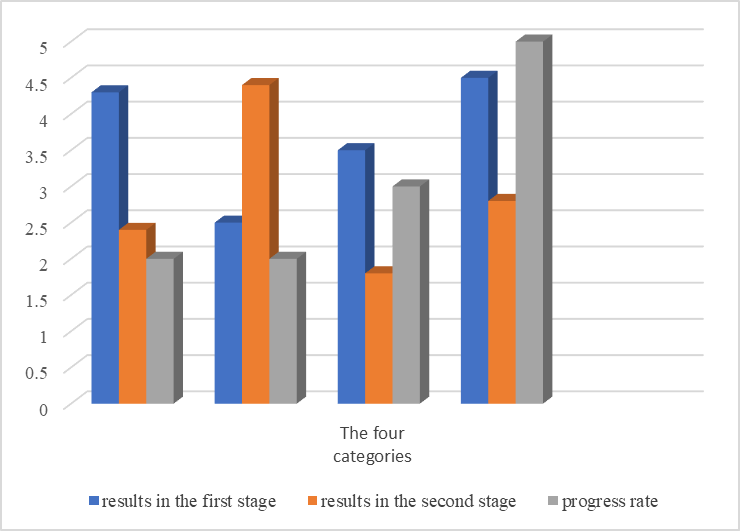
At the end of the experiment, students' portfolios were analyzed. The average of grades (8.83) obtained by students (146) in the subject
Conclusion
The parental education program has helped to facilitate understanding the role of parenting in the effective development of communication relationships within the school-family education partnership. Completing the selected contents in the training program offered the opportunity for constructive debates, encouraging the development of new contexts for addressing educational situations. The formative assessments made during the semester followed the quality of the students' intervention in the discussions, the sharing of learning experiences, the consistency of personal reflections, and the active involvement in solving the required tasks.
Students received feedback on tasks both through direct and on-line communication, were encouraged to develop new, personalized parenting programs, at the level of the groups / classes where they are teaching or they are conducting their pedagogical practice, by highlighting the positive aspects of the proposed programs. The experimental research has highlighted the usefulness of implementing strategies for the development of the specific abilities of parental education in the context of initial teacher education for preschool and primary education.
Acknowledgments
The authors would like to thank to all students involved in the research for taking the time and volunteer to participate in the present study.
References
- Catalano, H. (2018). Syllabus pentru disciplina Educaţie parentală – învățământ la distanță, Universitatea Babeș-Bolyai, [Syllabus for the subject Parental education – distance learning studies, Babeș-Bolyai University, Retrieved from e-learning website] – https://portal.portalid.ubbcluj.ro/CookieAuth.dll?GetLogon?curl=Z2F&reason=0&formdir=3
- Chiş, O., & Grec, C. (2018). Valuing Student’s Learning Styles in the Development of Professional Skills. The European Proceedings of Social & Behavioural Sciences, XLI, 81-85, http://dx.doi.org/10.15405/epsbs.2018.06.9
- Chiş, O., & Coste, M. (2018). Strategies, emotional intelligence, educational context. The European Proceedings of Social & Behavioural Sciences, XLI, 643-648,
- De’Ath, E. (1983). Teaching parenting skills, Journal of Family Therapy 5, 321-335
- Dulamă, M. E., & Ilovan, O.-R. (2015). Development of the Geography school curriculum in Romania, from the 18th century to 1989. Transylvanian Review, 24(Supplement 1), 255-284.
- Dulamă, M.E., & Ilovan, O.-R. (2016). How powerful is feedforward in university education? A case study in Romanian geography education on increasing learning efficiency. Educational Sciences-Theory & Practice, 16(3), 827-848.
- Dulamă, M.E., & Ilovan, O.-R. (2017). The development of geographical education in Romania, under the influence of the Soviet education model (1948-1962). Transylvanian Review, 26(1), 3-17.
- Dulamă, M.E., Ilovan O.-R., & Magdaş, I. (2017). The forests of Romania in scientific literature and in Geography. Teachers’ perceptions and actions. Environmental Engineering and Management Journal, 16(1), 169-186.
- Ilovan, O.-R., Jordan, P., Havadi-Nagy, K.X., & Zametter, T. (2016). Identity matters for development: Austrian and Romanian experiences. Transylvanian Review, 25(Supplement 1), 261-276.
- Ilovan, O.-R., Dulamă, M.E., Botan, C.N., Havadi-Nagy, K.X., Horváth, C., Nițoaia, A., Nicula, S. & Rus, G. M. (2018). Environmental education and education for sustainable development in Romania. Teachers’perceptions and recommendations. Journal of Environmental Protection and Ecology, 19(1), 350-356.
- Munteanu, C., Munteanu, E. N. (2009). Ghid pentru învățământul preșcolar. O abordare din perspectiva noului curriculum, [Guide for preschool education. An approach from the perspective of the new curriculum]. Iași, Editura Polirom.
- Oltean, A. (2016). The Preschoolers' Wellbeing – Main Objective of the Activities Conducted in Kindergarten, Arhipelag XXI Press, 404-411. Retrieved from https://old.upm.ro/gidni3/GIDNI-03/Pse/Pse%2003%2038.pdf
- Pavel, C. L. (2016). Educația părinților ca învățare transformativă. Teză de doctorat. Iași, Universitatea Alexandru Ioan Cuza [Parents education as transformative learning, (Doctoral thesis), Alexandru Iona Cuza University]
- Petrea, I. (2007). Și tu poți fi Supernanny. Cum să-ți crești bine copilul, [You can also be Supernanny. How to raise your child well]. București, Editura Trei.
Copyright information

This work is licensed under a Creative Commons Attribution-NonCommercial-NoDerivatives 4.0 International License.
About this article
Publication Date
25 June 2019
Article Doi
eBook ISBN
978-1-80296-062-4
Publisher
Future Academy
Volume
63
Print ISBN (optional)
-
Edition Number
1st Edition
Pages
1-613
Subjects
Teacher, teacher training, teaching skills, teaching techniques, special education, children with special needs
Cite this article as:
Chiș, O., & Alexandra, O. (2019). Developing Parent Educator Skills At Students Studying Preschool And Primary Education. In V. Chis, & I. Albulescu (Eds.), Education, Reflection, Development – ERD 2018, vol 63. European Proceedings of Social and Behavioural Sciences (pp. 472-482). Future Academy. https://doi.org/10.15405/epsbs.2019.06.56

